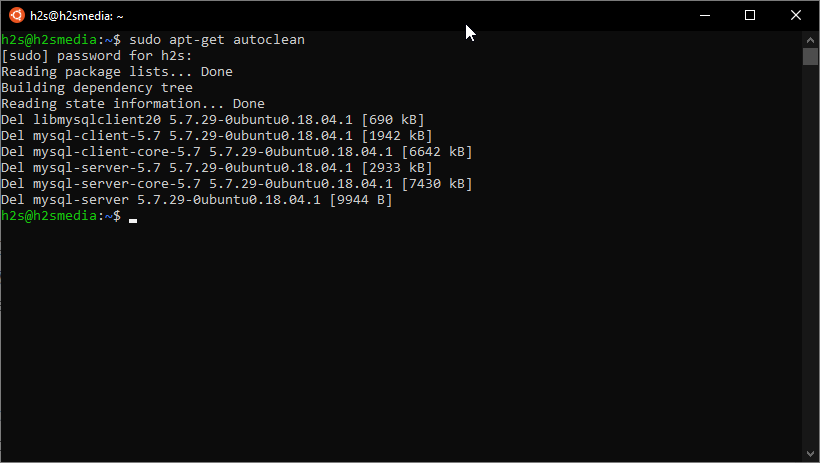
Note that for defragmenting a device (such as HDD) you need root privilegs, but not for your own files.
#Ubuntu clean disk space free#
Clear Trash / Temporary Files & Enable Auto Deletion: Emptying the Recycle Bin is always the first step to free up. Replace /dev/sda1 with the file system or folder/file you want. 10 Ways to Clean up Your Ubuntu System to Free up Disk Space 1. e4defrag -c /dev/sda1 # see overview of fragmentation status In Ubuntu, the disk space can be freed up by utilizing the method sudo apt autoremove pacakge-name, sudo apt autoremove, sudo apt autoclean, and. Now you can run the program with: cd $HOME/e2fsprogs/misc
#Ubuntu clean disk space install#
If not, execute: sudo apt-get install git-core (If you or the community has got a better way to install the program, please edit!)Īlso make sure that git-core is installed.
#Ubuntu clean disk space download#
With these commands, you download and compile e2fsprogs. Git clone git:///pub/scm/fs/ext2/e2fsprogs.git The last step is to defragment the file system. Important: Deleted cache cannot be restored! Do this by installing and running bleachbit: sudo apt-get install bleachbit One good step is to remove the application cache. In Synaptic, search for the old Kernel entries (every Kernel entry that is displayed in GRUB except the newest) and remove it. You can do this by installing and opening Synaptic. The fourth step is to remove old Kernel entries. You can also clear the package cache with sudo apt-get autoclean


Install it by entering sudo apt-get install fslint It’s much easier to look at gigabyte values as opposed to bytes. The -h flag tells the command to make the sizes human-readable. Then, there is a program for removing double files. You can get a quick and concise readout of the hard disk usage on your Ubuntu 20.04 system with the following command: df -h. By removing folders and files you don't need you get more space. Rm -rf /usr/share/man/* /usr/share/groff/* /usr/share/info/* /usr/share/lintian/* /usr/share/linda/* /var/cache/man/*įirst, there is a tool for listing all big folders and files. # find /usr/share/doc -depth -type f ! -name copyright | xargs rm || trueįind /usr/share/doc -depth -type f | xargs rm || true Remove the same set of files and directories in the project-config's postinst. # lintian stuff is small, but really unnecessary # path-include /usr/share/doc/*/copyright # if we need to keep copyright files for legal reasons: Clear pythons pip cache pip cache purgeĬheck your temp and cache folder ncdu /var/tmpĪdditionally you can remove manpages and documentation as described in the Ubuntu Wiki:Ĭreate a file /etc/dpkg//01_nodoc which specifies the desired filters. Snap remove "$snapname" -revision="$revision" \Ī great graphical GUI tool to fit all needs: sudo apt install bleachbit If you see something big and don't use it - uninstall it dpkg-query -W -showformat='$' | \ See list of all installed packages, sorted by size. Use File Usage Analyzer (AKA baobab GNOME based), Filelight or kDirStat (KDE based), to see where the disk space is going visually ( ncdu uses a TUI).Ĭheck if you have old kernels for deletion ls -lh /boot Show top 10 biggest subdirs in the current dir.


 0 kommentar(er)
0 kommentar(er)
